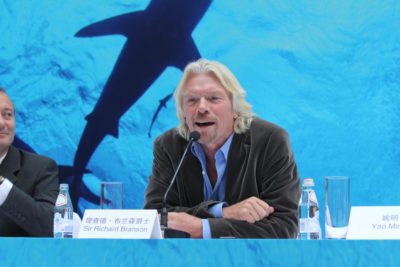
This week, Richard Branson and former Costa Rica president, José María Figueres Olsen, urged Costa Rica President Laura Chinchilla Miranda, in an open letter, to sign a Presidential Decree prohibiting the importation of all shark fins into Costa Rica.
Despite Costa Rica’s progressive environmental policies, earning it the title as the “greenest” country in the world according to the New Economics Foundation, Costa Rica has been unable to thwart legal loop-holes that enable shark finning, which has been prohibited under Costa Rica legislation since 2001.
Currently Costa Rica serves as a conduit to international markets; national and international fishing fleets are dropping long lines into the waters of Costa Rica and its neighbors. Sharks are caught in the lines and pulled up on board, where their fins are hacked off and the sharks are tossed back to sea to bleed to death. These fins are unloaded into adjacent countries, then imported into Costa Rica, where they are processed and further exported.
By signing a Presidential Decree, President Miranda will cut off one of many pipelines leading to the decimation of the world’s shark populations.
Branson and Olsen’s letter highlighted Costa Rica’s key role in shark conservation. Costa Rica is “blessed with valuable shark populations” and is home to one of the most important shark aggregation centers in the world, Coco Island National Park. Despite its distinction as a UNESCO World Heritage Site, Coco Island’s shark population is under extreme pressure from long-line fishing and illegal finning.
Without sharks in Costa Rica’s waters, the ocean ecosystem may very well collapse as sharks are critical keystone species. Given that nearly 25% of Costa Rica’s foreign exchange earnings depends on its natural wealth, as tourism has increased by 6-fold since 2000, a decline in sharks and ocean health will greatly impact local businesses as well.
The letter to President Miranda is one of many bold actions Branson has made in response to the global shark crisis. Earlier this summer Branson teamed up with WildAid in Isla Mujeres, where he swam with whale sharks. This event attracted international attention to the ecological and economic importance of whale sharks, demonstrating that the lifetime value of a live whale shark outweighs the single sale of shark fin by up to US$2 million. Last year, Branson also traveled to Shanghai on behalf of WildAid, where he met with fellow WildAid ambassador, Yao Ming, and leading Chinese entrepreneur Zhang Yue to call for greater protections of sharks as well as to premier two public service announcements urging the Chinese population to say no to shark fin soup.
Stay in touch and get the latest WildAid updates.
SIGN UP